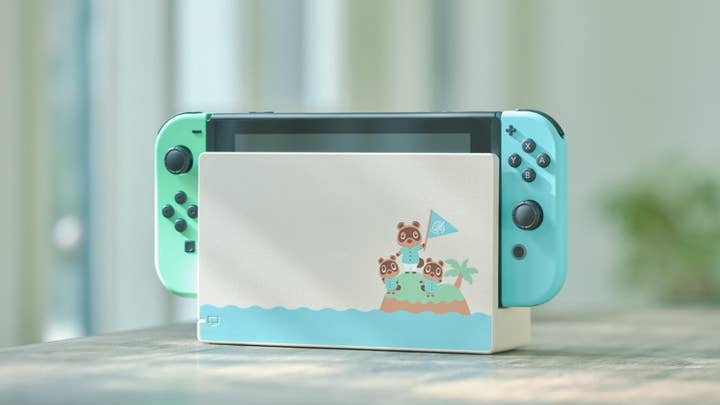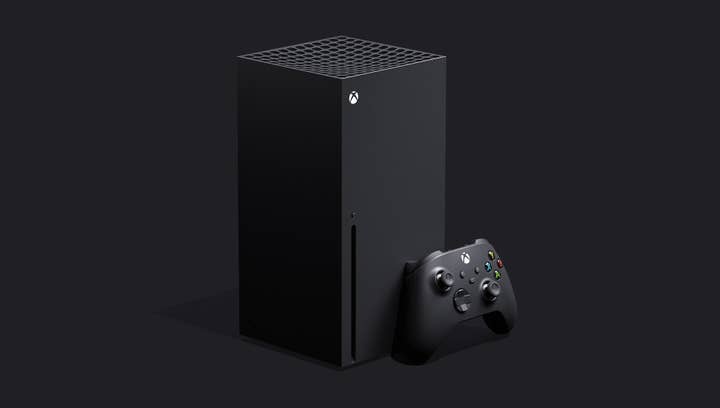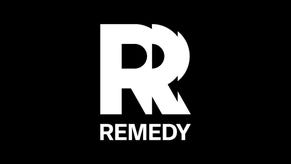COVID-19 looms over planning for next-gen launches | Opinion
The epidemic threatens to shut down supply chains the entire games industry relies on -- and even push new console launches into next year
Donald Trump's decision to stir up a tariff conflict with China focused minds on the role that the country plays in global supply chains for almost every kind of product. Now it looks like the outbreak of the new COVID-19 strain of coronavirus is about to give the world an unwelcome first-hand demonstration of what happens when those supply chains stall or shut down.
The extent to which measures against the spread of the virus -- including the shutdown of many workplaces, schools and businesses -- have impacted global supply chains is only gradually becoming clear. What we've seen thus far in economic terms really only qualifies as shots across the bow, such as Apple's warning on revenues for the quarter, some relatively minor impact on stock markets, or the cancellation of the Mobile World Congress trade show.
Most people in the games industry are aware, on some level, that just about every piece of hardware this business relies upon has a supply chain that passes through China at some point. Consoles, PCs, mobile devices of all flavours; whether they're actually assembled in China or not, every last one of them contains various components that are sourced from or via the country.
"Just about every piece of hardware this business relies upon has a supply chain that passes through China at some point"
China's importance as a market in its own right should not be underestimated, of course, but its role in the supply of gaming hardware to every other market is even more crucial. If China's factories fall silent, even for a few months, the knock-on effect will be felt in the business of every single company that supplies game hardware, sells game hardware, or relies on a growing installed base of game hardware for its business. For some of those companies, the timing is especially disastrous, as it raises questions over the timescales for an event that brooks little uncertainty: the launch of a new generation of console hardware.
Before delving into the details of that, I should make clear that delays or problems created for companies launching game consoles or other firms in related industries are far, far from being the most pressing or important thing to consider related to COVID-19. It is a disease with a death toll that continues to rise, and which has already caused immense suffering and distress, especially for the people of the most-affected parts of China, not to mention a shameful rise in incidences of racism targeting Asian people in many parts of the world.
COVID-19 is an extremely serious topic in its own right, and our industry's concerns over its impact are but a small and relatively insignificant side-show in the broader context. Nonetheless, they are serious in terms of the business of games and the livelihoods of those who work in this industry, and merit some discussion and consideration even in the shadow of the much larger unfolding tragedy.

We are already seeing some peripheral impact from COVID-19 on industry supply chains and activities. Nintendo Switch, currently by far the best-selling console, is seeing supply difficulties, and Nintendo is being forced to delay plans for an Animal Crossing themed bundle to accompany the launch of its first major 2020 title in Japan next month. Sony has just pulled out of PAX East, one of the bigger trade shows on its calendar this year, citing concerns over COVID-19; it's unlikely that this show would have been an early stop on the PS5's inevitable announcement tour, given how early in the year it falls, but it's still a notable loss to the company's ability to drum up publicity for its key titles for the coming months.
"What happens to the planned launches of PS5 and Xbox Series X if the COVID-19 situation is not resolved rapidly, let alone if it escalates?"
[Note: Sony and Facebook announced their withdrawal from GDC 2020 after this article was submitted.]
Behind these minor setbacks looms a much bigger question: what happens to the planned launches of PS5 and Xbox Series X if the COVID-19 situation is not resolved rapidly, let alone if it escalates? How long of an interruption to the supply chain can the ramp-up of manufacturing and supplies for those launches tolerate before plans have to be altered -- perhaps drastically?
The autumn launch window for the consoles feels quite far away, but it's not really. The process of establishing and stocking up a manufacturing and supply chain for a complex device like a new games console rarely has much tolerance for delays. Factories need to be retooled to manufacture the console components and ultimately assemble the console itself. Supply chains stretching all the way back to raw materials need to be operating smoothly, and stockpiles need to be built up to provide for a major global launch.
An irresolvable delay to a single component would upset the entire process and prevent the product from launching. That's why there's generally redundancy in place, a fallback plan for each and every step along the way -- but there's no redundancy plan for the entire country which is the engine room of the world's manufacturing shutting down for weeks if not months on end.
Teams at Sony and Microsoft -- and at their suppliers, and at other companies around the industry -- are undoubtedly wargaming out the options for various different scenarios already. Plans for several different contingencies are required, because there's still so much we don't know; the very worst case scenarios, of course, render the question of game console launches this year something of a moot point, but there is a lengthy scale of possibilities on the way to that level of nightmare.
Factories could begin re-opening within a matter of a few weeks -- or it could take months, with full capacity not even being restored by the end of the year. The worst of the epidemic might be confined to China, leaving manufacturing capacity in other countries -- Taiwan, Vietnam and Thailand being the key hubs of high-tech manufacturing outside China -- relatively untouched; or it might already be too widespread in other nations to be effectively contained, resulting in a cascading shutdown of industry across the region.
"Even the best-case scenario will be a headache for supply chain managers and those planning the console launches"
Even the best-case scenario will be a headache for supply chain managers and those planning the console launches. As the timescales for the restoration of manufacturing capacity stretches out, the odds of major new product launches being possible this year will become increasingly slim.
Contingency planning for those scenarios may take a number of different forms, though each company will play its cards very close to its chest in regard to what it actually has in mind. Delaying the actual launch of a console into next year is something both firms will wish to avoid if at all possible, especially if they have an inkling that their competitor might be able to get to market ahead of them somehow. Intermediate steps along the way might include launches with very limited supply -- which might actually suit both firms to some extent, given the rumours that controlling the hardware cost for the new platforms is proving problematic -- or going back to the bad old days of consoles rolling out globally on a staggered timescale, with some territories waiting for many months to get their hands on the new hardware.

The actual impact of this would on one level be immense, effectively denying a major holiday selling season to the new machines at launch. However, this would be quite a unique situation, because the companies that would normally capitalise upon that weakness will be similarly afflicted. Nintendo would be the obvious candidate to thrive on the difficulty of the other two firms -- another holiday season all to itself! -- but it is also facing Switch shortages and likely making similarly grim contingency plans to Microsoft and Sony.
"How many of 2020's sales will be lost forever in the case of delays to major launches -- and how many will simply be postponed?"
Threats from outside the games business, in the form of consumer hardware like phones and tablets, are in the same situation; all of them will face dramatic stock shortages and the prospect of delayed hardware launches if China isn't open for business for a significant part of this year. The other potential fallback, in the form of a price cut to existing hardware (the PS4 and Xbox One X) in the hope of sparking one final bonanza holiday season before the new consoles finally arrive, is similarly off the cards -- there likely isn't enough inventory of PS4 and Xbox One X in the channel for either Sony or Microsoft to really capitalise on any delay to the new generation.
That still leaves some potential winners. Software manufacture won't be impacted, and of course downloads won't feel any impact at all, so the sale of titles for existing hardware may see a boost from extra disposable income sloshing around. If the virus does spread more widely, we may even see a rather grim upside for the industry, as software sales could see a boost from people staying indoors as a precaution. We've already seen soaring demand for Nintendo's Ring Fit in China, for instance, though the factories that would make Ring Fit inventory to fill that demand are also presently shut down.
There are also some smaller corners of the industry that face an even bigger problem than the console manufacturers. Peripheral makers, for example, will be extremely badly hit, while the burgeoning VR headset market, which was meant to get a shot in the arm from the launch of Half-Life: Alyx in just a few weeks, now looks likely to end up on ice for much of this crucial year in its market development.
Given that this situation effectively amounts to a freeze on everyone, rather than affording a competitive opportunity to any given company, the real question in the long term may be how many of 2020's sales will actually be lost forever in the case of delays to major launches -- and how many will simply be postponed until the hardware eventually arrives. While Apple's warning over its revenues as a result of COVID-19 was stark, the response from most analysts and investors has been muted; they have essentially concluded that most people who don't buy an iPhone in this quarter (due to COVID-19 fears causing both reduced footfall in stores and supply chain problems) will probably buy one in the next quarter.
Hardware, be it a high-end phone or a new games console, is a very different business to something like Starbucks or McDonalds, which genuinely lose sales forever when something like this happens. Games consoles should, in theory, broadly fall into that category, but that might be cold comfort for businesses across the industry, from retail to development and everything in between, if we end up facing the prospect of a strange 2020 holiday with scarcely any gaming hardware to be found on the world's store shelves, or under the world's Christmas trees.









